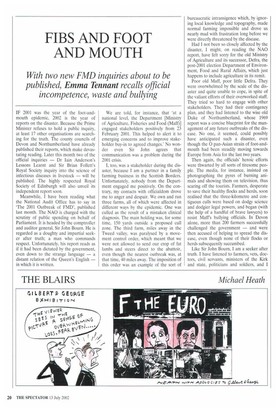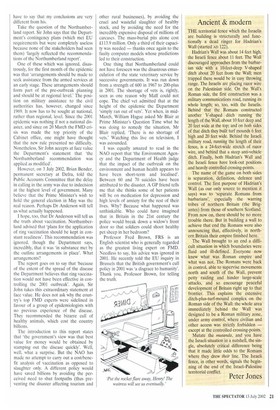FIBS AND FOOT AND MOUTH
With two new FMD inquiries about to be published, Emma Tennant recalls official
incompetence, waste and bullying
IF 2001 was the year of the foot-andmouth epidemic, 2002 is the year of reports on the disaster. Because the Prime Minister refuses to hold a public inquiry, at least 17 other organisations are searching for the truth. The county councils of Devon and Northumberland have already published their reports, which make devastating reading. Later this month two of the official inquiries — Dr fain Anderson's Lessons Learnt and Sir Brian Follett's Royal Society inquiry into the science of infectious diseases in livestock — will be published. The highly respected Royal Society of Edinburgh will also unveil its independent report soon.
Meanwhile, I have been reading what the National Audit Office has to say in 'The 2001 Outbreak of FMD', published last month. The NAO is charged with the scrutiny of public spending on behalf of Parliament. It is headed by the comptroller and auditor general, Sir John Bourn. He is regarded as a doughty and impartial seeker after truth; a man who commands respect. Unfortunately, his report reads as if it had been dictated by the government, even down to the strange language — a distant relation of the Queen's English — in which it is written. We are told, for instance, that at a national level, the Department [Ministry of Agriculture, Fisheries and Food (Maff)] engaged stakeholders positively from 23 February 2001. This helped to alert it to emerging concerns and to improve stakeholder buy-in to agreed changes.' No wonder even Sir John agrees that communication was a problem during the 2001 crisis.
I, too, was a stakeholder during the disaster, because I am a partner in a family farming business in the Scottish Borders. Unfortunately, nobody from the Department engaged me positively. On the contrary, my contacts with officialdom drove me to anger and despair. We own and run three farms, all of which were affected in different ways by the epidemic. One was culled as the result of a mistaken clinical diagnosis. The main holding was, for some time, 150 yards outside a proposed cull zone. The third farm, miles away in the Tweed valley, was paralysed by a movement control order, which meant that we were not allowed to send our crop of fat lambs and steers direct to the abattoir, even though the nearest outbreak was, at that time, 40 miles away. The imposition of this order was an example of the sort of bureaucratic intransigence which, by ignoring local knowledge and topography, made normal farming impossible and drove us nearly mad with frustration long before we were directly threatened by the disease.
Had I not been so closely affected by the disaster, I might, on reading the NAO report, have felt sorry for the old Ministry of Agriculture and its successor, Defra, the post-2001 election Department of Environment, Food and Rural Affairs, which just happens to include agriculture in its remit.
Poor old Maff, poor little Defra. They were overwhelmed by the scale of the disaster and quite unable to cope, in spite of the valiant efforts of their overworked staff. They tried so hard to engage with other stakeholders. They had their contingency plan, and they had listened to the wise old Duke of Northumberland, whose 1969 report was a concise blueprint for the management of any future outbreaks of the disease. No one, it seemed, could possibly have anticipated such a disaster, even though the 0 pan-Asian strain of foot-andmouth had been steadily moving towards Europe from Asia for the last two years.
Then again, the officials' heroic efforts were thwarted by all sorts of tiresome people. The media, for instance, insisted on photographing the pyres of burning animals and showing them on television, thus scaring off the tourists. Farmers, desperate to save their healthy flocks and herds, soon realised that the three-kilometre and contiguous culls were based on dodgy science and dodgier legal powers, and began (with the help of a handful of brave lawyers) to resist Main bullying officials. In Devon alone, more than 200 farmers successfully challenged the government — and were then accused of helping to spread the disease, even though none of their flocks or herds subsequently succumbed.
Like Sir John Bourn, I am a seeker after truth. I have listened to farmers, vets, doctors, civil servants, ministers of the Kirk and state, politicians and soldiers, and I
have to say that my conclusions are very different from his.
Take the question of the Northumberland report. Sir John says that the Department's contingency plans (which met EU requirements but were completely useless because none of the stakeholders had seen them) 'largely reflected the recommendations of the Northumberland report'.
One of these which was ignored, disastrously, for the first month of the epidemic was that 'arrangements should be made to seek assistance from the armed services at an early stage. These arrangements should form part of the pre-outbreak planning and should be at regional level.' The position on military assistance to the civil authorities has, however, changed since 1969. It now has to be sought at national, rather than regional, level, Since the 2001 epidemic was nothing if not a national disaster, and since on 20 March the FMD crisis was made the top priority of the Cabinet office, one might have thought that the new rule presented no difficulty. Nonetheless, Sir John accepts at face value the Department's statement that 'the Northumberland recommendation was applied as modified'.
However, on 3 July 2002, Brian Bender, permanent secretary at Defra, told the Public Accounts Committee that the delay in calling in the army was due to indecision at the highest level of government. Many believe that the Prime Minister's wish to hold the general election in May was the real reason. Perhaps Dr Anderson will tell us what actually happened.
I hope, too, that Dr Anderson will tell us the truth about vaccination, Northumberland advised that 'plans for the application of ring vaccination should be kept in constant readiness'. This recommendation was ignored, though the Department says, incredibly, that it was in substance met by the outline arrangements in place'. What arrangements?
The report goes on to say that 'because of the extent of the spread of the disease the Department believes that ring vaccination would not have been effective in controlling the 2001 outbreak'. Again, Sir John takes this extraordinary statement at face value. He does not ask why the country's top FMD experts were sidelined in favour of a group of epidemiologists with no previous experience of the disease. They recommended the bizarre cull of healthy animals, which cost the country billions.
The introduction to this report states that 'the government's view was that best value for money would be obtained by stamping out the disease quickly'. Well, well, what a surprise. But the NAO has made no attempt to carry out a cost/benefit analysis of vaccination as opposed to slaughter only. A different policy would have saved billions by avoiding the perceived need to shut footpaths (thus preventing the disaster affecting tourism and other rural businesses), by avoiding the cruel and wasteful slaughter of healthy stock, and by avoiding the need for the incredibly expensive disposal of millions of carcases. The mass-burial pits alone cost 1113.9 million. Only a third of their capacity was needed — thanks once again to the faulty computer models whose predictions led to their construction.
One thing that Northumberland could not have foreseen was the disastrous emasculation of the state veterinary service by successive governments. It was run down from a strength of 600 in 1967 to 200-plus in 2001. The shortage of vets is, rightly, seen as one reason why Maff could not cope. The chief vet admitted that at the height of the epidemic the Department 'simply ran out of vets'. Yet when, in midMarch, William Hague asked Mr Blair at Prime Minister's Question Time what he was doing to remedy the situation, Mr Blair replied. 'There is no shortage of vets.' Watching this live on television, I was astounded.
I was equally amazed to read in the NAO report that 'the Environment Agency and the Department of Health judge that the impact of the outbreak on the environment and human health appears to have been short-term and localised'. Between 60 and 70 suicides have been attributed to the disaster. A GP friend tells me that she thinks some of her patients will be on medication for depression and high levels of anxiety for the rest of their lives. Why? Because what happened was unthinkable. Who could have imagined that in Britain in the 21st century the police would break down a widow's front door so that soldiers could shoot healthy pet sheep in her bedroom?
Professor Fred Brown, FRS is an English scientist who is generally regarded as the greatest living expert on FMD. Needless to say, his advice was ignored in 2001. He recently told the EU inquiry in Brussels that the British government's cull policy in 2001 was 'a disgrace to humanity'. Thank you, Professor Brown, for telling the truth.



































































 Previous page
Previous page